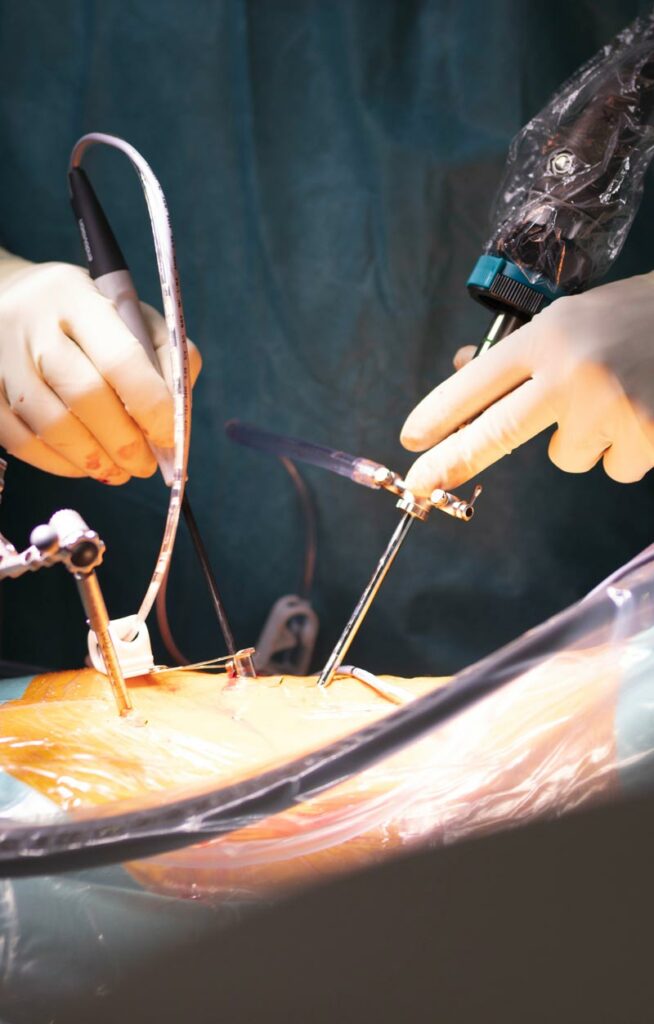Discover Endoscopic Spine Surgery
(UBE for Unilateral Biportal Endoscopy)
A revolutionary advance in spinal surgery. Thanks to this ultra-minimally invasive technique, you can benefit from significant advantages for treating problems such as herniated discs or narrowing of the lumbar spinal canal. Book a consultation today to find out more.
What is UBE surgery
for the spine ?
Biportal endoscopic spine surgery is an advanced technique that allows access to the spine through small incisions, thus reducing scarring and post-operative recovery time, as it causes less damage to muscles and other bone structures than conventional open surgery.
It offers a less invasive solution to spinal problems such as lumbar or thoracic disc herniations and stenosis (Lumbar Spinal Stenosis). It is even possible to treat pathologies of the cervical spine with this technique.

ADVANTAGES
of endoscopic surgical techniques for the spine
Less invasive
Smaller incisions reduce scarring and tissue damage. The use of a camera optic enables a closer view of the treatment target, also reducing the risk of surgical complications.
Faster recovery
You can return to your daily activities quicker than with conventional open surgery.
Surgical risk reduced
The risk of complications is low, as with open surgery (and possibily even lower according to ongoing clinical studies), and with the advantage of less post-operative pain and faster functional recovery.
PROCEDURE
of endoscopic spine surgery (UBE)
Step 1:
Preparation
Patient is prepared and undergoes general anesthesia.
Step 2:
Insertion of the endoscope
The endoscope is inserted through a small incision to visualize the target area. Another small incision, 2 to 3cm apart, is used to insert the instruments that will do the work.
Step 3:
Operative procedure
The surgeon uses specialized instruments to treat the spine, herniated disc or lumbar spinal stenosis. The endoscope enables the surgeon to monitor the work of the instruments as closely as possible.
Step 4:
Fermeture
Incisions are closed with sutures. Sometimes a small drain is left in place to prevent hematoma.
POST OPERATIVE RECOVERY
after an endoscopic surgery of the spine
Post-operative monitoring
Your medical team will monitor you closely to make sure you recover properly.
Rehabilitation
After a 2-week active rest period, you will be guided through rehabilitation exercises to help strengthen your back and restore mobility.
Resuming activities
Gradually, you will be able to resume your normal daily activities. Sports activities can be resumed very quickly and gradually from the 2nd postoperative week.
RISKS AND COMPLICATIONS
of endoscopic spine surgery
Infection
There is a small risk of infection after surgery (<2%), but this is rare and can be treated with antibiotics.
Dural leak
Dural breaches are the most frequent complication, but remain rare (2-4% according to studies), with no serious long-term consequences. This is a small breach of the envelope containing the small nerve roots.
Nerve injury
The risk of serious neurological injury (paralysis) is close to 0%. Closer surgical visualization via the endoscope reduces the risk of damage to neurological structures, compared with open surgery.
FREQUENT QUESTIONS
about endoscopic spine surgery
What is the rate of success ?
In a clinical study we have carried out, which is awaiting publication, we were able to demonstrate a significant improvement in patients’ function and pain, very quickly after surgery. Numerous other published studies underline the advantages of biportal surgery over open surgery.
How long does the surgery last ?
This depends on the pathology to be treated. It ranges from 40-60 minutes or less for a herniated disc, to 1h30 for the treatment of a one level lumbar stenosis.
What is the typical recovery time after surgery? ?
Our patients gradually resumed their sporting activities 2 weeks after surgery, with very little surgical pain. Several professional athletes that we have treated returned to competition 1 month after surgery.
Are the scars visible ?
The scars on the skin are very small and the trauma to the muscles is minimal.

How Can I book
a consultation ?
To make an appointment for a consultation, please fill in the online appointment form or call our office. Our team will be delighted to assist you.